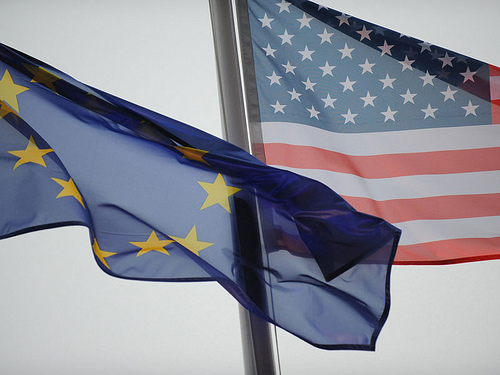
With Egypt dominating most of the world’s headlines, European headlines include developments in Belarus, news of a 2.4% inflation increase in the Eurozone, and Hungary’s new willingness to discuss its controversial media law.
HEADLINES:
U.S. joins EU in new sanctions on Belarus (Reuters)
The United States on Monday imposed new financial and travel sanctions on Belarus in response to the government’s crackdown after December’s disputed presidential elections, the State Department said.
The new sanctions, which follow similar moves announced by the European Union, expand the number of Belarus officials covered by travel and financial restrictions and revokes temporary authorization for business deals with two subsidiaries of Belneftekhim, the country’s largest state-owned petroleum and chemical conglomerate, a State Department statement said.
Serbian PM wants ‘truth’ over organ-harvesting allegations (EUobserver)
Serbian Prime Minister Mirko Cvetkovic has said he is committed to discovering the "truth" about the recent allegations made by Council of Europe investigator Dick Marty.
Speaking in Brussels on Monday (31 January) after a meeting with European Commission President Jose Manuel Barroso, Mr Cvetkovic pledged not to politicise the December 2010 report which accused Kosovar Prime Minister Hashim Thaci of being responsible for the murder of Serb prisoners and the sale of their kidneys in the 1990s.
Eurozone inflation accelerates to 2.4% (AFP)
Eurozone annual inflation shot up to 2.4 percent in January, the EU warned Monday, fuelling household fears of an earlier rise in interest rates than anticipated, though experts insisted they see no need.
An Economic Government for the Euro Zone?: Merkel’s Plan Could Transform the European Union (Spiegel Online)
German Chancellor Angela Merkel wants to stabilize the euro through a "pact for competitiveness" that would force EU members to coordinate their national policies on issues like tax, wages and retirement ages. The plan would transform the EU if it becomes reality, but resistance will be fierce — including from within Merkel’s own governing coalition.
Munich conference to discuss Russia-NATO missile defense network (RIA Novosti)
The creation of a joint Russia-NATO missile defense network will be a key issue on the agenda of the upcoming global security conference in Munich, a German diplomat said on Monday.
Crisis in Egypt Holds Risk, Promise for Turkey (Wall Street Journal Europe)
Turkey’s policy makers are watching Egypt’s political crisis with a mixture of anxiety and relish. The reason: they’re worried about an economic backlash but potentially are poised to enhance their diplomatic influence since the Turkish political model could become a possible replacement for the region’s teetering autocracies.
Hungary ready for media law talks (European Voice)
The Hungarian government today said it was ready to talk to the European Commission about its controversial media law, and if necessary make changes to the law.
In a letter sent to the Commission today (31 January), Tibor Navracsics, Hungary’s minister of public administration and justice, said that while he thought the media law was in line with EU rules, his government was ready to make changes if asked to do so.
New START to Take Effect Within Days (Global Security Newswire)
Russia and the United States are set on Saturday to exchange ratification instruments for a new bilateral strategic nuclear arms control treaty, formally entering the pact into force, Agence France-Presse quoted a high-level Russian official as saying last week (see GSN, Jan. 28).
Facing Sanctions, Belarus Frees Seven Political Prisoners, but a Dozen Remain in Jail (International Herald Tribune)
Belarus has begun releasing opposition political figures in what appears to be a last-minute attempt to mollify European leaders who are preparing to impose sanctions this week against the nation’s president, Aleksandr G. Lukashenko, and his government.
EDITORIALS AND COLUMNS:
Five Steps to Help Belarus (The Washington Post)
Senator John Kerry and Senator Joe Lieberman outline five key points that the U.S. and EU to pressure the “authoritarianism repression” of Belarusan President Alexander Lukashenko.
Turkey and Ukraine — different but similar (Today’s Zaman)
Once upon a time Turkey and Ukraine were defining the destiny of Europe. Now they have seemingly been sidelined. Both are knocking on the EU’s door and both are being told, more or less, that they are not welcome.
Apparently they are too different to be part of Europe. While Turkey may be different in terms of religion and culture, it shares and desires the same values and goals as Europe (the values that the EU is built on and supposed to stand for) and has been anchored and involved in Western institutions for years (NATO, the Organization for Security and Cooperation in Europe [OSCE], Council of Europe, etc.). Ukraine is apparently “too Soviet,” or so I am told. Ukraine may be at the heart of Europe but it seems the mentality and the so-called “Soviet legacy” culture of its people are simply too different and incompatible. Or perhaps it’s simply because they are both too big — just thinking of how many seats the two nations would have in the European Parliament is probably a very scary thought for some.
Spain, hostage to the eurozone (The Guardian)
It has become fashionable since Spain’s economy began to decline to make comparisons to Germany, which is rebounding strongly. The idea is that the Germans went through their restructuring, got organised labour under control, and thereby made their economy more competitive. According to this narrative, this is the key to their economic success – so Spain should do the same, if the Spanish economy is to recover.
Image: transatlantic.jpg
